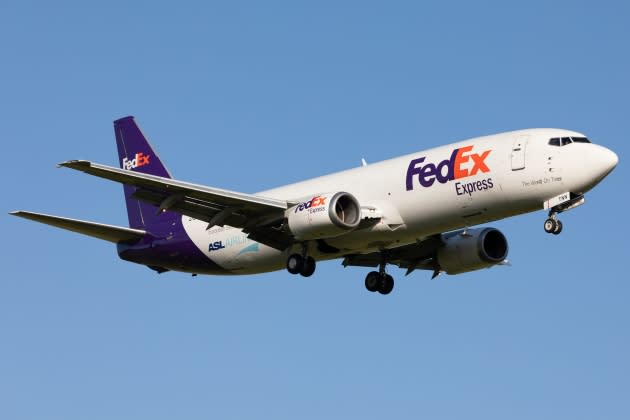FedEx Pilot Drama Renews Logistics Labor Worries

As if the UPS contract negotiations hadn’t created enough drama across the supply chain before a tentative deal was struck, other contract agreements still hang in the balance—creating new uncertainty on when big employers will reach labor deals with unionized pilots and dockworkers.
On Monday, 57 percent of FedEx pilots represented by the Air Line Pilots Association (ALPA) rejected a tentative five-year contract. And Tuesday, union dockworkers at the Canada ports will mull over the terms of settlement of the tentative deal that leaders of the International Longshore and Warehouse Union (ILWU) Canada agreed on earlier this month.
More from Sourcing Journal
FedEx said it was “disappointed” in the voting results, but pointed out that service won’t be affected. The proposed deal included a 30 percent pay increase and a 30 percent increase to the pilots’ legacy pensions. However, that’s lower than the 40 percent increase that ALPA-represented United Airlines pilots received in a new contract agreement earlier this month.
“We can’t thank the Negotiating Committee team enough for their tireless devotion. While it fell short of the membership’s expectations, we are grateful for their tremendous effort,” ALPA leadership said in a letter to union members. “We will respect the decision of the membership, chart a new path and be ready to re-engage as soon as possible. We ask that you remain unified and trust that the process will ultimately produce an agreement that all FedEx pilots will be proud to support.”
Both FedEx and ALPA will restart negotiations under the supervision of the National Mediation Board. There is no timetable for when this meeting would occur.
While the 5,200 pilots cannot strike immediately, 99 percent voted to authorize a strike in May.
But the Railway Labor Act, which covers both railroads and airlines, has guardrails in place to keep unions from striking. The legislation is designed to prevent the possibility of strikes or lockouts that could cripple the U.S. transportation system.
Before a strike can take place, the National Mediation Board must first decide that additional mediation efforts wouldn’t be productive. From there, it must offer the parties an opportunity to arbitrate the contract dispute.
If either side declines the arbitration, both groups enter a 30-day “cooling off” period. If they can’t reach a deal, the union could go on strike—but only if Congress stays out of the situation. It stepped in to avert a nationwide rail strike at the end of 2022.
“Our members have spoken and we will now regroup and prepare for the next steps. In the coming weeks, the FedEx ALPA leadership will meet to establish a timeline for assessing pilot group priorities moving forward,” said Chris Norman, chair, FedEx ALPA. “FedEx pilots remain unified and that will drive a new path that will help produce an agreement that all FedEx pilots will be proud to support.”
Ahead of the news that UPS and the Teamsters agreed to a tentative agreement, FedEx also reiterated that it was protecting capacity and service for existing customers in the event of a strike.
With FedEx pilots rejecting a deal, the focus now moves up north where the ILWU Canada is looking to finally end the on-again, off-again labor negotiations at Canadian West Coast ports.
On Tuesday, the British Columbia ports shut down for the morning shift as union leadership recommended the four-year settlement terms to its 7,400 member employees.
The ILWU caucus already has approved the terms, which were proposed by senior federal mediator Peter Simpson and ratified by the British Columbia Maritime Employers Association (BCMEA).
Voting will be held on Thursday and Friday at local ILWU branches.
Like the FedEx deal, there is no guarantee that the union members will agree to the terms that have been agreed on by ILWU leadership.
There’s no timeline on when a deal will be finalized. Five days after reaching a deal on July 13, the ILWU voted down the tentative settlement terms—effectively going back on strike. A federal watchdog deemed the strike illegal on July 19, forcing the union to set up a new 72-hour strike notice. But within hours, the union retracted the notice.
The union reneged after Canada’s Prime Minister Justin Trudeau convened a meeting of the country’s Incident Response Group to bring an end to the work stoppage.
Solve the daily Crossword

